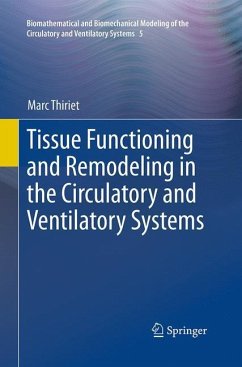The volumes in this authoritative series present a multidisciplinary approach to modeling and simulation of flows in the cardiovascular and ventilatory systems, especially multiscale modeling and coupled simulations. Volume 5 is devoted to cells, tissues, and organs of the cardiovascular and ventilatory systems with an emphasis on mechanotransduction-based regulation of flow. The blood vessel wall is a living tissue that quickly reacts to loads applied on it by the flowing blood. In any segment of a blood vessel, the endothelial and smooth muscle cells can sense unusual time variations in small-magnitude wall shear stress and large-amplitude wall stretch generated by abnormal hemodynamic stresses. These cells respond with a short-time scale (from seconds to hours) to adapt the vessel caliber. Since such adaptive cell activities can be described using mathematical models, a key objective of this volume is to identify the mesoscopic agents and nanoscopic mediators required to derive adequate mathematical models. The resulting biomathematical models and corresponding simulation software can be incorporated into platforms developed in virtual physiology for improved understanding and training.
Bitte wählen Sie Ihr Anliegen aus.
Rechnungen
Retourenschein anfordern
Bestellstatus
Storno








